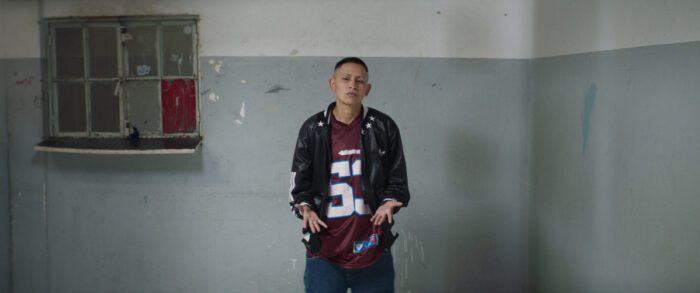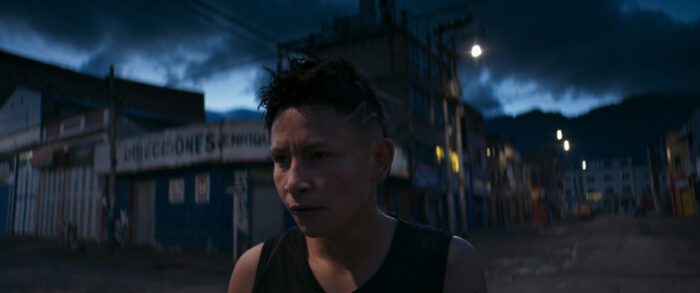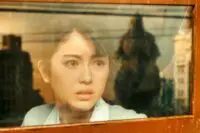Un varón (A Male), Colombia’s official nomination for the Oscars’ Best International Feature category, takes on its topic of toxic masculinity with an approach that on the surface seems almost counterintuitive. This debut film from writer-director Fabián Hernández isn’t the rough-and-tumble action of The Wild Ones, the psychological torment of Taxi Driver, or the narrative trickery of Fight Club. Instead, it’s a slow burn of mesmerizing imagery and a subtle examination of how gender dynamics play out in the gang-run streets of Bógota.
The film’s opening sequence resembles nothing so much as an arthouse documentary, as several young men speak directly to the camera, as if being interviewed, in uncut, centered medium shots. For each of them, conformity to a traditional, if narrowly prescribed, masculinity is a trap, one made on the streets, where its reach works like an octopus’ tentacles, pressing on the young. “No snitches, no weirdos, no faggots,” says one as they cumulatively lay out the “rules” of masculinity they’ve come to understand; none of them are identified immediately, but later, they’re revealed as staff members at a youth shelter, daily witnesses to the young men living on Colombia’s streets and prisons with little hope for the future.

Only then does the story center on its protagonist, a young man named Carlos (Dylan Felipe Ramirez Espitia), who is followed at first from behind in an image reminiscent of Barry Jenkins’ Moonlight. Homeless, Carlos bunks and showers in the youth shelter and, as the holidays approach, wants little more from life than to spend a Christmas with his mother and his sister. But each of them lives in a turmoil equal to our greater than his own: his mother is incarcerated and his sister eking out her own life on the streets. With no real family life, no home, and no prospects, there’s little for Carlos to look to each night beyond a fitful sleep on a seedy cot in the shelter.
On the streets, machismo rules. Only the toughest survive. Carlos is a slender, slight, quiet boy who finds himself under the protection of a buff, confident dealer, Freddy, who knows the score. Freddy is an alpha male who knows and sets the rules for others. He employs Carlos and bluntly instructs him in the ways a young man is allowed, in his world, to perform and behave.
With a street thug like Freddy his only real mentor, Carlos looks to be following in his path. Working out, selling drugs, partying, fighting, moving up in the organization—there’s really no place, it seems, for Carlos to go other than down the same path as so many other men before him. But Carlos is a bit more sensitive and nuanced than his peers, and when he chafes, even a little, at the role Freddy has planned for him, he ultimately has to make a choice between following the only societal expectation he knows and trying to forge a life for himself outside the grip of Bógota’s gangs.

As Carlos, Dylan Felipe Ramirez Espitia is tight-lipped, speaking mostly only when spoken to. Football jerseys and elaborate hair stylings and piercings present a complex gender performance, one chafing against conventional gender norms. There are no overt coming-out scenes but instead a simple self-reflective experimentation that reveals more than any hackneyed pronouncement might: facing a mirror, Carlos pencils a thick lipstick on his reflection, considering for an anguished moment whom he might become in a circumstance different from his own.
Un Varón‘s narrative is deeply personal—it is concerned with Carlos’s plight and none others’—but it’s clearly intended as a case study in Colombia’s socio-economic turmoil, one that might apply to any number of countless youth not knowing how to navigate gender dynamics and social expectations in a city plagued by drug use, poverty, and violence. The young men who spoke to the camera in the film’s opening continue to do so, on occasion, interrupting the narrative to outline societal expectations like a modern Greek chorus. The impending holiday, meanwhile, and Carlos’ hope for family reunion, seems like a cruel joke played on a young man mere moments away from being trafficked, imprisoned, or worse.
Director of photography Sofía Oggioni follows Carlos from behind from scene to scene (in a visual motif echoing Moonlight, another story of a non-normative youth living on society’s margins), with impeccable compositions, artful lighting, and a slow, languid pace that heightens Carlos’ psychological dilemma. There’s no narrative trickery, no melodramatic confrontations, really even next to no violence on camera—but it is always in the background, threatening to erupt at any moment. Oggioni and Hernández focus far more on Carlos’ internal turmoil than on the gang violence that rules the streets, their slow-cinema approach allowing for a uniquely contemplative take on toxic masculinity that makes Un varón something of a sui generis film, a nonviolent exploration of violence, a non-masculinist exploration of masculinity.
One can’t expect a film like this to end in any traditional way. There won’t be a false happy ending or a conclusive showdown. There is only Carlos and his continual struggle. As Freddy enlists Carlos deeper in his criminal operation, the stakes get higher and higher until Carlos must, finally, make a fateful choice between the life he wishes he could lead and the one he feels the streets dictate that he must. Un varón may not be for everyone, but in its short (82-minute) runtime, it offers up a unique visual and narrative approach to a conventional social problem—the misunderstood young male at a fork in the path of adulthood—that makes for an intriguingly queer take on the matter.
Having premiered at Cannes 2023 Directors’ Fortnight, and winner of numerous international festival awards, Un varón will debut in North America at Cinema Village in New York City starting Friday, December 8, 2023, with additional screenings scheduled for Los Angeles, San Francisco, and Washington DC.




